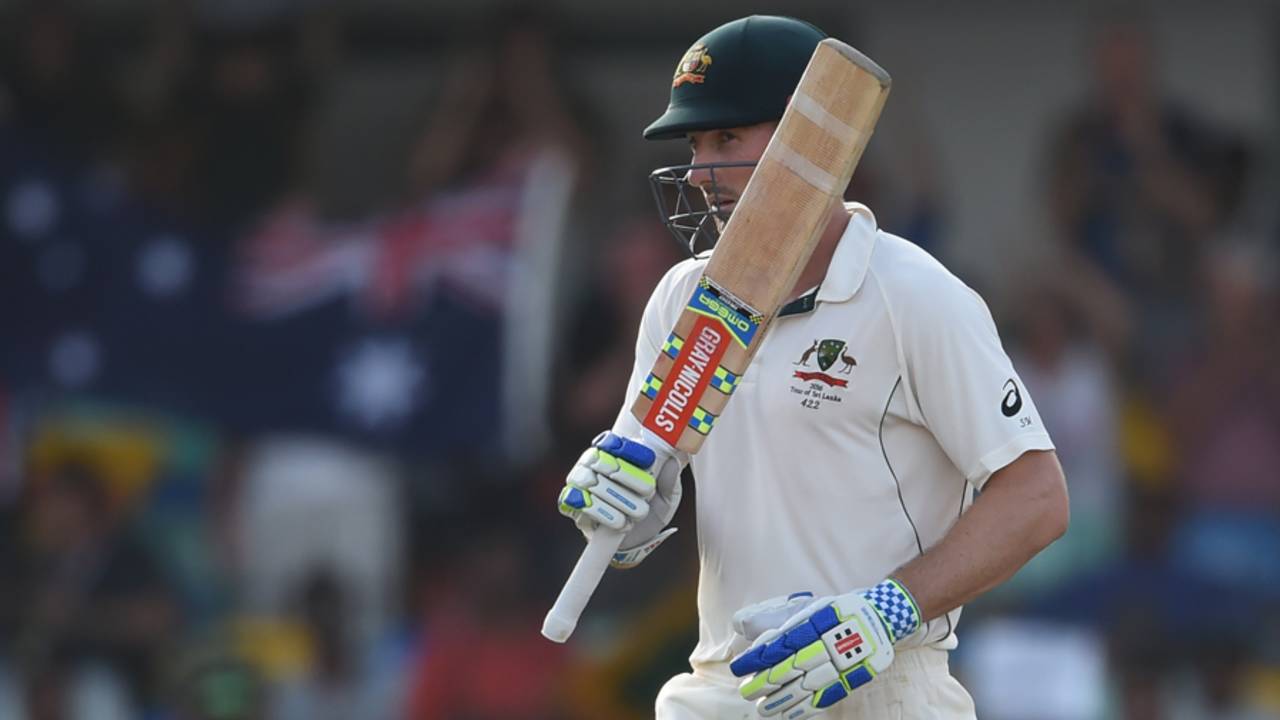Shaun Marsh the Peter Siddle of 2016
The inclusion of Shaun Marsh has added belated solidity to a batting line-up that could have done with his brand of batting when the destination of the Warne-Muralitharan Trophy was still up for debate
Daniel Brettig in Colombo
14-Aug-2016
Shaun Marsh is the only batsman in the current squad to have a Test century in Sri Lanka • AFP
A year ago, almost to the day, Australia played a dead Test against England at The Oval. The touring team had been through the darkest of midlands valleys in Birmingham and Nottingham, losing the Ashes in a pair of humiliating defeats that exposed the XI as wholly unsuited to the conditions.
But with the urn gone and critics sharpening their caustic prose, the team responded with a far better display in that final Test. They were helped in part by the conditions - it is harder to "green up" the Oval wicket than those of Edgbaston or Trent Bridge - and also by the reduced intensity of a less consequential Test match.
Nevertheless, an innings victory was nothing to be sniffed at, and a fitting farewell for the dual retirees Michael Clarke and Chris Rogers, who were soon to be joined on the sidelines by Shane Watson, Brad Haddin and Mitchell Johnson in addition to the already retired Ryan Harris. A key member of the win was Peter Siddle, an older head ideally suited to English seamers yet somehow ignored until too late to make a difference to the series result.
Twelve months on and Colombo seems about to bear witness to a similar sequence. The first two Tests have gone conclusively Sri Lanka's way, and the pitch at the SSC is the series' fairest if also its driest. Meanwhile, the inclusion of Shaun Marsh has added belated solidity to a batting line-up that could have done with his brand of batting when the destination of the Warne-Muralitharan Trophy was still up for debate.
Many a cricket follower likes to poke fun at Marsh, he of the near binary home series against India a few years back, then a series-shaping hundred in South Africa followed immediately by a pair in the next Test and omission from the decider. Then there was the day he was run out for 99 chasing a first Test hundred in Australia - moments that have ensured few cricketers can polarise like him now that Watson in particular has retired from the national team.
But at the same time, Marsh is the only member of this squad to have in his possession a Test hundred in Sri Lanka, on debut in Pallekele nearly five years ago. The next Test was played at the SSC, and it was Marsh's ever-so-patient 81 that anchored an otherwise wobbly top order. Bizarrely, that match was Marsh's last Test match in Asia until this week.
The horrors of 2011-12 at home banished him from the Test team for quite some time, meaning he did not figure in the squads to go to India in 2013. He was set to go to the UAE in 2014, before an elbow injury sustained in the IPL necessitated surgery and a delayed start to the 2014-15 season. In both cases, Australian results on tour suggested they could have and indeed did do worse by not having Marsh available to use his mercurial talents in conditions where he was less likely to fall prey to bounce and seam.
Marsh's height and reach allow him a decent stretch forward. His power and timing allow him the ability to generate bat speed and scoring zones when he has little pace to work with. Equally, his vast experience in the IPL has given him a level of accomplishment in numerous attacking strokes to spin, and a courage to use them regardless of whether the ball is turning or not. In short, Marsh has a game that can work in this part of the world, a rare gift among contemporary Australian batsmen.
One of the key findings of the Australian tour party on this trip is the fact that top six success at home is no sort of indicator for how batsmen will fare in Asia. Before this match, the coach Darren Lehmann contended that changing last summer's combination pre-emptively would likely have met with a cold public response. "If you have a look at our summer and the way our batters played," he asked, "if we didn't take any of those batters, how would we be viewed in the press?"
Yet it should be among the first lessons learned by any selector that their job is not to curry public favour but to choose winning teams. Earlier in the same press conference, Lehmann had spoken of the importance of batsmen being "proactive, not reactive" when spinners have conditions in their favour, a maxim he lived by with great success. Selection for Colombo, also including Moises Henriques as a specialist batsman, was nothing if not reactive.
As Marsh accumulated calmly on the second afternoon, looking so secure where Joe Burns had been skittish and Usman Khawaja stranded, it was hard to escape the sense that much like Siddle he had been ignored for too long on this tour. Whether or not Australia have other batsmen at home who may also be able to aid the next Asian assignment in India next year remains to be seen, but certainly Peter Handscomb will have his claims.
Either way, Lehmann, Rod Marsh and the rest of the selection panel must start to show their proactive side as a matter of urgency. As former Test cricketers, all are conscious of the gravity of their roles, and of a responsibility not to be flippant. But to badly misquote Oscar Wilde: selecting one player too late may be regarded as a misfortune; to do it again starts to look like carelessness.
Daniel Brettig is an assistant editor at ESPNcricinfo. @danbrettig
